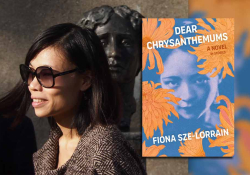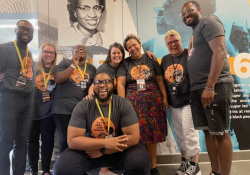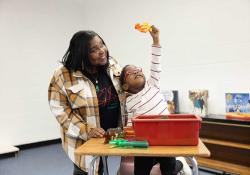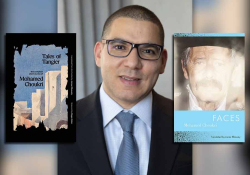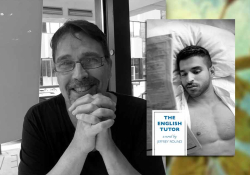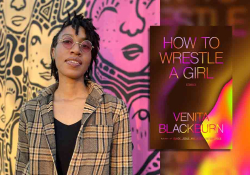When Science Fiction Is an Invitation: A Conversation with Elaine U. Cho
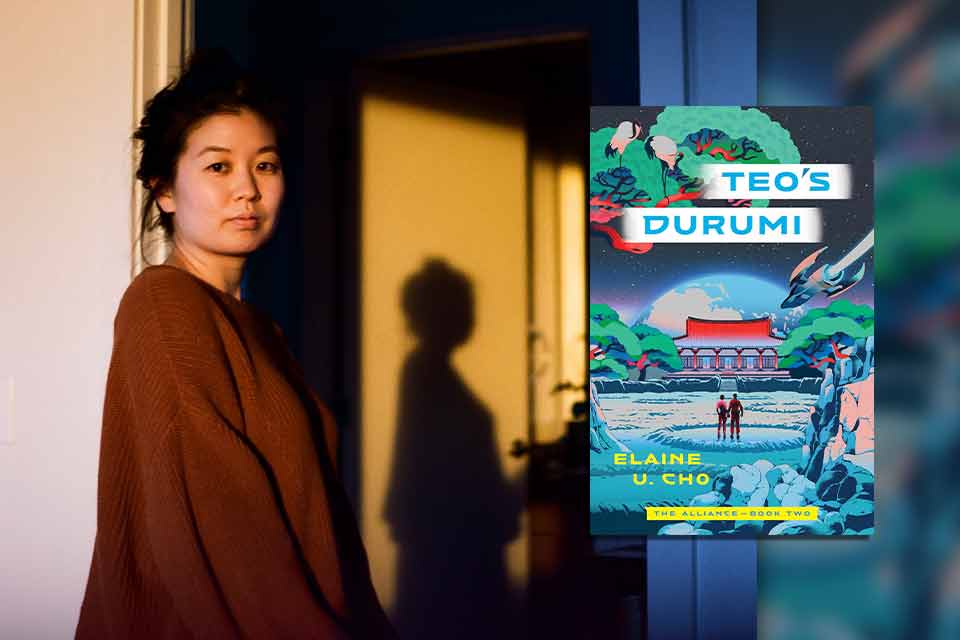
Teo’s Durumi (Zando, 2025), the latest book in Elaine U. Cho’s adventure-filled Alliance series, follows a tightknit crew as they battle for justice in the solar system. As Cho and I settled in to discuss Teo’s Durumi and the Alliance series, we couldn’t help but start with inequities close to home—in particular, my beautiful, bleeding city of Los Angeles, a city Cho had just visited on her book tour. We talked about how heavy pollution often taints our air and ocean, how every year brings increasingly fatal fires caused by a human-made climate crisis, and how, even more pressing, many in our community avoid stepping outside for fear of being swept off the street by masked government agents.
I confessed to Cho that it’s tempting, especially now, to dismiss humanity as a self-destructive and violent species—after all, if we widen our perspective even a little, we must contend with apocalyptic atrocities far worse than those currently plaguing Los Angeles. When I encounter Cho’s work, however, I’m left with another understanding of humanity, one that dares me to acknowledge what about us might be worth saving.
It’s not that the Alliance series ignores our ugliness. In fact, many of its events stem from the exploitative practices of a corporation called Anand Tech. Yet at the heart of these books is a group of people who band together for the sake of themselves and one another, and for the entire solar system. Reading Ocean’s Godori, the first book in the series, made me feel a little more hopeful. Reading Teo’s Durumi made me want to fight for us and our future.
But these works are stunning not just because they pull heavy ideological weight; they are also unfailingly entertaining. I feared for titular characters Teo and Ocean during their epic battles. I felt the swerves and jostles of Ocean’s ships as she raced through space, and I yearned for Teo to kiss a certain character (you’ll have to read to find out who). This is the power of books: to remind us of who we are, whom we can be, and, if we’re lucky, to engage our imaginations deeply while doing so.
Emily Doyle: When did you start thinking about the questions at the core of the Alliance series, which seem to be about the tension between hopelessness and hopefulness, between greed and generosity? Were these themes present when you began working on the series, or did they emerge gradually?
Elaine U. Cho: They emerged gradually. Whenever I’m writing, characters and character arcs come first. Thematic questions arise out of the characters’ struggles. When we first went on submission with Ocean’s Godori, Sareena Kamath, the editor I ended up signing with at Zando, sent this beautiful email about how she loved the characters. But she also commented on how the book is a subtle exploration of the themes you mentioned, which are rooted in colonialism. So, of course I said, Oh yeah, I totally meant for it to be that way, when really, I did this almost without my knowing it at first.
But it just makes sense that the Alliance series would contend with issues of colonialism and greed. Even though I wrote the series years ago, it was during a time where I felt this pressing avalanche of horrible global news. I felt the helplessness of just being one person and wondering what I could possibly do. And now that the books have come out, here we are again.
Doyle: The idea of feeling helpless in the face of catastrophe makes me think of Corvus, who I’ll call the antagonist even though that might be an imperfect term for him. Several sections of Teo’s Durumi are written from Corvus’s perspective, sections I found both disturbing and gripping because they make it clear that while Corvus is hurting and killing people, he also believes he’s fighting for the good.
One such moment stood out to me in particular: “What Garrett never understood was that pain’s never been Corvus’s end goal. He wants to break down what separates people. You can’t force another person to feel, but the desire to hurt someone who has hurt him . . . that’s a form of empathy, isn’t it? It’s drawing someone in to feel your pain.”
This passage made me wonder about the distinction between a villain and hero.
Cho: Well, I’m glad that you question whether we should actually label Corvus an antagonist. Because you’re right—he’s not necessarily an antagonist or villain. He’s a tragic figure. He does awful things, but he’s also had awful things done to him. And his goal isn’t necessarily nefarious on its own. He wants to increase empathy in the universe. That’s the idea behind his big technology.
Doyle: Would you mind saying a little about what that technology is?
Cho: Yes, he’s using a technology that allows him to fuse with other people, to take their memories and identities, which drains the person. He thinks he’s doing this to understand others and to keep them from leaving him, and he thinks he’s fighting Anand Tech, a corporation that has caused hurt through insensitivity and distance from the people they’re affecting. But now he’s the one hurting others, and that is what leads to his villainy.
Doyle: One of the most fascinating parts of Corvus is how separated he ends up becoming from his original goal, and how he doesn’t even notice when it happens. While his language remains reassuring, his actions grow crueler and deadlier. I’m interested in how Corvus loses sight of himself.
Cho: That’s exactly what happens to him. You know, I was trying to examine this concept in every relationship—this concept of maintaining one’s identity and how it relates to loving an idea or even another person. For instance, can we honor the people we love while remaining intact? I wonder how much one should give of themselves when they’re in an intense relationship with another person, whether as a lover, friend, child, or parent.
Doyle: Yes, every relationship in this series seems to require that internal negotiation. I’d love to linger for a moment on the importance of friendship in your work, especially the friendship between Teo and Ocean. It’s rare to find fiction that treats friendship with the same gravity as romantic relationships.
Cho: I definitely intended to prioritize friendship. Teo and Ocean’s relationship was the first thing that was concrete in my mind. In fact, the impetus for the series stems from Ocean’s wanting to protect Teo no matter the cost, and the series ends with their friendship, too. It’s the centerpiece even though the romances are of course important as well.
Doyle: Oh, to be clear, I love the romances in these books, too.
Cho: They weren’t even planned in the draft. They just wanted to happen, and I let them.
Doyle: Thank you for letting them happen! I was eager for Teo to kiss certain people.
Cho: Of course! But yes, it was vital to me that Teo and Ocean have a complicated and deep friendship. Overall, I would say that in this series, friendship is the best ship.
I would say that in this series, friendship is the best ship.
Doyle: I love that. I admire how you write about friendships. They feel just as fraught and special and solid as they do in real life.
Cho: Thank you, that means a lot.
Doyle: Another significant bond in this series—and this might seem like an unexpected digression, but I think it’s related—comes from food. Many science fiction writers seem interested, primarily, in exploring the unfamiliar in the worlds they have created. In this series, though, you seem equally interested in the familiar as well. I’m thinking, for example, of the following passage from Teo’s Durumi: “Ocean hears more tussling and her mother blares into her ear again. ‘Ocean come home.’ Her heart leaps, and she pictures her mother opening the door where a hot meal will be waiting for her on a low table. A comforting bubbling jjigae, the bracken she has picked and washed with her own hands, the tightly packed kimchi.” Are you using food throughout this series to bind the past, present, and future?
Sci-fi allows me to connect with people of all different backgrounds. It lets people in.
Cho: Yes, I think that’s a great way to put it—binding the past, present, and future. That’s very much what the books are about. The food itself is not just a world-building tool. It’s also rooted in nostalgia. Often, second-generation kids like me use food to connect to a culture from which we have felt somewhat separate. While our tongues might not speak the language fluently, they recognize the taste of the food. We remember gathering around a jjigae or a tteokbokki with friends and family. We remember the camaraderie of that.
But I wasn’t writing about these points of experience for second-generation kids only. I was also using food specifically, and the sci-fi genre more generally, to invite other readers into a culture with which they might not be as familiar. Sci-fi allows me to connect with people of all different backgrounds. It lets people in.
Often, second-generation kids like me use food to connect to a culture from which we have felt somewhat separate.
Doyle: You know, this idea of using the sci-fi genre to include rather than exclude makes me think of the Mortemians in this series. They are a group of people who oversee funeral rites. And because of their association with death, much of society ostracizes them. Many are afraid to even touch them, worrying that if they do, they’ll be made unclean.
At one point in Teo’s Durumi, a Mortemian named Haven says, “To scapegoat a group unites the remaining people, but perhaps there’s a way forward without instilling fear. Without separating out others.” Haven seems to be pushing back on the inevitability of the outsider. He seems to be questioning whether it is actually necessary to even have in-groups and out-groups.
This struck me as a vitally important idea right now, in this time when current politics rely on the supposed inevitability and necessity of exclusion, whether that exclusion manifests in terms of whom we deem worthy of healthcare, whom we let past our borders, or which starving children we care about and which we do not. I was wondering if you could speak more to Haven’s perspective.
Cho: Well, I think a lot of Haven’s perspective goes hand in hand, strangely enough, with what Corvus wants. Because fear of the Mortemians is bound up with fear of the unfamiliar. The Mortemians exist in a world where technology has advanced to the point that society is much further removed from death due to extended lifespans. So, ironically, fear of death increases, and those who have to deal with death are stigmatized. At the same time, Mortemians take pride in their isolation. But Haven begins to wonder if all the separation is actually needed. He wonders about the ideas of inclusion and exclusion.
While I was writing this series, I read Are Prisons Obsolete?, by Angela Davis. Even though Davis wrote it decades ago, it’s still so relevant. In this book, Davis questions a firmly entrenched idea, asking whether we actually need prisons for society to exist.
Like Haven, Teo also begins to question ideas he grew up with. He tries to wrap his mind around the possibility that there is a way forward, even if he hasn’t quite figured it out yet. He begins to have faith that he might find a better path with the help of others, and that that path won’t be based on inequality or exclusion.
Doyle: Do you agree with Haven and Teo? Do you think there is a positive way forward for us, as a society?
Cho: Yes. I don’t have the answers, but I do think there is a way forward. The world in which we live is very scary, built on harsh and true realities that cannot be ignored. But I think there’s a way to acknowledge the current situation—for instance, our planet being what it is because of what we have done to it over the past decades—and still act on what can be done now for the sake of a livable future. The Alliance series, like many works of science fiction, relies on this being true.
Elaine U. Cho is the author of Ocean’s Godori and Teo’s Durumi. She has an MFA in flute performance from CalArts and is a former film critic, former bookseller at Elliott Bay Book Company, and current associate editor for Shelf Awareness.

